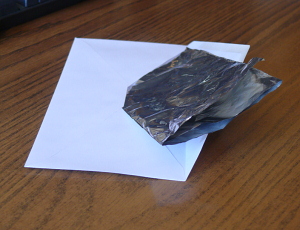
|
17A040 Mailable, Private Money by Jim Davies, 11/14/2017
Transactions made between people without the benefits of government scrutiny, permits or taxation make up the free market. It's also called the Underground Economy, the Black Market (by its enemies), the White Market (by me) and the Informal Economy. So as to be efficient, it needs a medium of exchange, or money. Currently estimated to make up a healthy 10% on top of the "official" US economy of $20 trillion, the White Market will grow in size as people graduate from the Freedom Academy, in an exponential manner - very few now, a very large number a decade from now. Before that time, it will be helpful if a suitable form of money has gained general acceptance. Probably there won't be a single choice for money - no need for that - but just as probably, there will be a small number of such forms which are widely accepted. Less confusing, that way. And there will be (because there is already, to a small degree) need for one form that is convenient for transactions at a distance: mailable cash money, that is not subject to the steep loss of value when government fiat, paper money inevitably hyperinflates. An efficient way to transmit money already exists, of course, in Paypal; but alas, government can and does gain access to all Paypal accounts upon bureaucratic whim, so that is very far from private. Blame government, not Paypal; if they didn't cooperate, they would be put out of business. Such is fascism. Another promising way to do it is Bitcoin, which offers the big advantage of not being tied at all to the government monopoly of the "dollar", and of being transmittable with a good degree of privacy in what is (to me) a rather complex process. Bitcoin suffers at present from wild fluctuations in value, but that may settle down. Traditionally gold and (for small-value transactions) silver have been favorite forms of money, but when coined these cannot be sent electronically and when mailed physically are rather easily detected; the bulk and shape of the coin can be felt through the envelope by any Post Office employee retained as a government snitch. That problem was solved by E-Gold and its rivals, but government swiftly corralled those enterprises back under its control by allowing them to continue in business only if accounts were made available to its snoops. So there is need for a low-profile way to send cash in the form of gold or silver, and I have come up with a simple concept which meets that need. If you know of a silversmith or Goldschläger who can turn it into practical reality, let me know please, pronto.
So, by beating or rolling the metal into thin flat sheets, we have a very low-profile way to mail real money - as easily as one might mail the monopoly money known as "dollar bills" today, but denominated by weight It's not hard to calculate the value of such a sheet. I have a ream (500 sheets) of copy paper here, which measures 8½ x 11 x 2 inches or (to make the math easier) 21.59 x 27.94 x 5.08 centimeters, making 3064 cubic centimeters. Therefore each sheet has a volume of (3064/500 = ) 6.13 c.c. The density of silver is 10.49 and of gold, 19.32 grams/c.c. so the weight of a whole sheet of silver would be 64.29 grams and of gold, 118.41 grams. Today's exchange rates are respectively $0.5497 and $41.09 a gram, so a silver sheet would convey $35.34 worth of value and a gold sheet, $4,865.37. Perforations, or a pair of scissors, would enable the mailing of smaller or intermediate sums. Now, they would clearly be vulnerable to government use of metal detectors in Post Office Sectional Control Facilities, through which all mail passes. However, the expense and trouble of installing those in several hundred SCFs would not be trivial, nor would it be undertaken until the use of this private mailable money had been identified as a "problem." At that point, however, the disintegration of government will be gathering momentum, so its ability to do anything rapidly will be crumbling; and a very few years after that, it will all be history. Sheet money would therefore be most useful from now and during those few turbulent years. Once government has evaporated (because nobody will work for it) the White Market will be the only one in existence, and this creative form of private money will no longer be needed; the original idea of firms like Paypal will be free to operate with complete privacy and so physical cash will probably be used only in face to face transactions and for those, silver and gold coins are very convenient as they were for centuries before governments outlawed them. But in the exciting years during the Transition to Liberty, gold and silver sheets, one tenth of a millimeter thick, could fill a void. |










